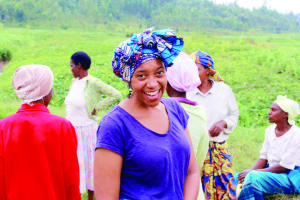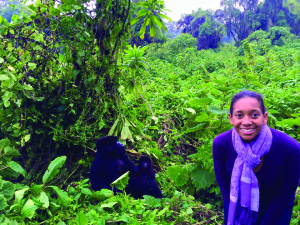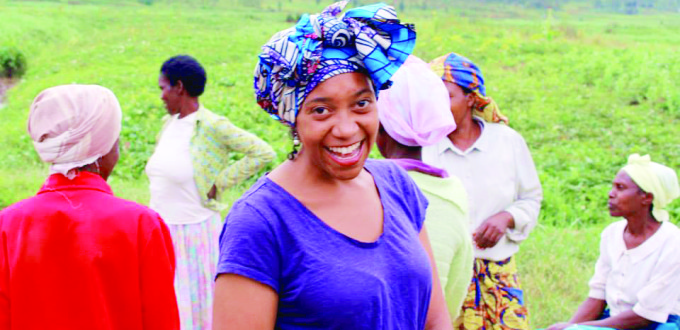Ms. Brownlee, resident justice-expert and purple-enthusiast, is the closest thing I have to a spiritual advisor. Two important notes about that: this is not a religious thing, and Ms. Brownlee doesn’t know I think this. This undercover discipleship stemmed from my fascination with Ms. Brownlee’s constant joy. As a bit of a cynic, I found the constant happiness that Ms. Brownlee exudes disorienting when I first met her my sophomore year. After about two years of casually profound bewilderment as to how she could maintain her everyday delight in the world while teaching the school’s darkest class, Holocaust and Contemporary Genocide, I gave up and moved on with my life as junior year ended.

As a graduate of this Holocaust and Contemporary Genocide class, I was wildly excited when I heard that Ms. Brownlee would be traveling to Rwanda and other parts of East Africa this past summer as part of a Sidwell Friends service trip. During the time leading up to Ms. Brownlee’s departure, I kept trying to get dramatic reactions out of her, just so I could feel like she was as excited as I was about her trip. Each of my idiotic attempts was met with the same patient smile that Ms. Brownlee gives all of us annoying students–a classic Brownlee move. Regardless of my persistent inquisition, Ms. Brownlee departed directly from a Social Action meeting to the airport, leaving my questions unanswered. That was the last I heard from her for the summer.
Two months later, more Social Action training rolled around and with it came my first opportunity to interrogate Ms. Brownlee about her life-changing, mind-blowing trip to Rwanda. My interrogation was a bit of a letdown. I was thrown as to why Ms. Brownlee didn’t come back “changed”; I didn’t understand how she could have been exposed to all of these new ideas and remain the same. Don’t get me wrong, the way that she spoke of her trip to Rwanda was full of delight and reverence, but I’ve heard her talk about a really good salad the exact same way. And while I’m sure that salad was extraordinary and deserved its praise, I wanted to know what made this trip worth more than a salad. I wanted her to come back with some piece of wisdom that would arouse some philanthropic drive in me.

School started again, college meetings began, healthy sleeping habits stopped, and I still felt unfulfilled about the Rwanda trip. My only thought was to give the interrogation one more go, never minding Albert Einstein’s maxim, “Insanity is doing the same thing over and over again and expecting different results.”
My interview started exactly the way I expected it to.
Claire Biffl: Why was this trip important to you?
Lauren Brownlee: Intellectually, the ability to dive deeper was really exciting, but then the social justice part of myself was also really thrilled because it’s such an incredible opportunity to see how people have banded together after a tragedy to try to make a better country.
Classic Brownlee eloquence.
CB: And did this trip reinforce your beliefs, or did it change anything about the way you thought?
LB: It reaffirmed my optimism; it reaffirmed my thinking that the power of love has no bounds. Just the joy that I was able to see there […] was really powerful.
CB: Were there any moments that this idea was particularly evident?
LB: We went to this seaweed farm.
CB: Tell me more about the seaweed farm.
LB: We got these hats and these walking sticks and we went out to where they farm seaweed […] And the women who were doing it, who were referred to as the “Mamas,” were just so joyful about it the whole time. And then at the end they started singing “Hakuna Matata,” and it was just this day! Like, oh my goodness, if you’re committed to being joyful, then anything can be that spark for your joy.
In our community, everyone is affectionately familiar with Ms. Brownlee’s theory that love is always the answer. However, we often take that lesson in stride, not dismissing it, but just accepting it as part of Ms. Brownlee’s identity and not part of our own; it’s her “thing.” Here’s the wild conclusion that I came to after speaking with Ms. Brownlee: joy is not exclusive. Finding the same amount of joy in a salad as in a trip to Rwanda does not diminish your joy, it merely increases your opportunities to be joyous.

Leave a Reply